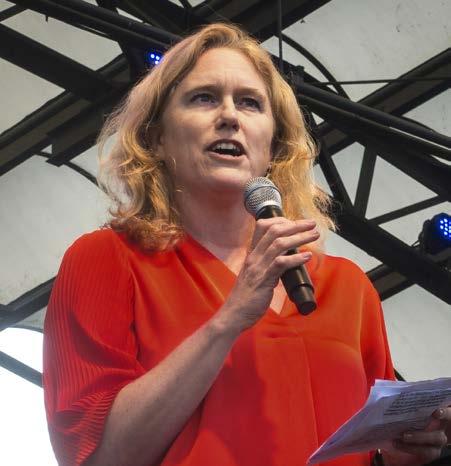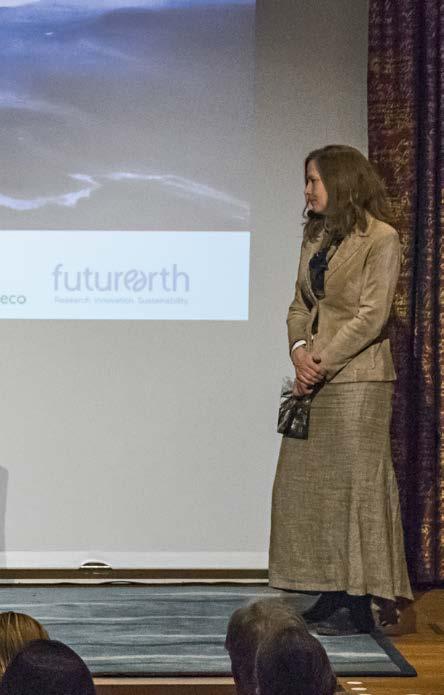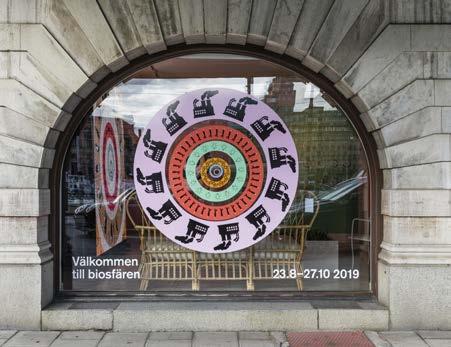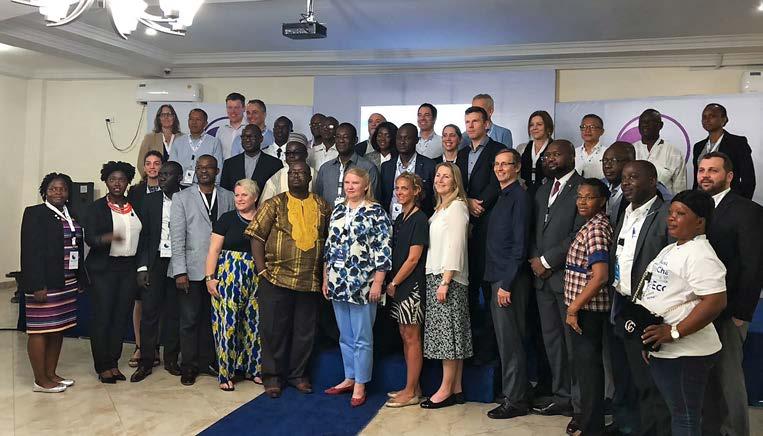
6 minute read
Seminars and events
Centre director Line Gordon was the main speaker at the Fridays for Future climate demonstration on 27 September in Stockholm. It attracted 50,000 people and ended in the Kungsträdgården park for concerts and speeches.
#FridaysForFuture: Centre researchers help
Advertisement
public awareness
GRETA THUNBERG’S science-based #FridaysForFuture movement has created a global mobilisation against environmental change. It has also encouraged researchers to reach out with their knowledge on the topic. In 2019, Stockholm-based researchers from a wide variety of disciplines set up a weekly “Researchers Desk” in downtown Stockholm to discuss and answer questions from concerned citizens. It started as part of the first global strike in March 2019 but continued throughout the year, including the strikes in September and December. Several centre researchers were involved. The initiative was borne out of former teacher Toya Westberg’s concern that climate and sustainability science was not made sufficiently available to schools and to the general public. Today, the initiative is highly sought after. Schools want to know more about climate change and its many implications both on society and individuals. For instance, centre guest researcher Helen Fischer talked to

secondary school students about climate communication and psychology. She was intrigued by the students’ interest and knowledge of the topic. Elsewhere, centre researchers My Sellberg and David Armstrong McKay held one of the most well attended talks on tipping points and transformation during the annual youth activist conference from Power Shift Network.

Stockholm Seminars
In 2019, the Stockholm Seminars celebrated its 200th seminar, highlighting three generations of water resilience researchers at Stockholm Resilience Centre
WHEN THE SRC was launched in 2007 the Stockholm seminars were already an institution. It started in 2000 with the idea of seizing the opportunity when high-level experts came to Stockholm for various meetings and commitments. Since then the seminars have featured prominent experts on global sustainability. The vision behind the seminar has always been to encourage interactions not only within the sustainability science community but also between science and society as a whole. The seminars are open to the public. With the Royal Swedish Academy of Sciences as a venue, they are hosted by the Beijer Institute of Ecological Economics at the Royal Swedish Academy of Sciences, Albaeco, Future Earth and Stockholm Resilience Centre. In 2009, a celebratory 100th seminar was held. Nine years later, in March 2019, it was time for the 200th seminar. Coinciding with World Water Day, three generations of water

resilience researchers at Stockholm Resilience Centre shared their research and reflections on the multiple ways that freshwater sustains the biosphere and human development. This included Blue Planet Prize 2018 awardee Professor Malin Falkenmark’s life work of articulating water’s fundamental role for earth’s life support system, innovating the understanding of water scarcity, and propelling the recognition of green water as a valuable and manageable resource; centre director Dr Line Gordon’s decade-long research unravelling the critical roles of “invisible” water for social-ecological resilience; and Dr Lan Wang-Erlandsson’s account of the newest advancements towards a revised freshwater planetary boundary.
Seminars 2019
6 MARCH Ecological apocalypse can also be a source of hope: cascading regime shifts within and across scales Juan Rocha, researcher at Stockholm Resilience Centre
22 MARCH Water as the bloodstream of the biosphere 200th Stockholm Seminar: with Carl Folke, director of the Beijer Institute of Ecological Economics of the Royal Swedish Academy of Sciences and science director of Stockholm Resilience Centre at Stockholm University; Malin Falkenmark, professor at Stockholm Resilience Centre and Stockholm International Water Institute; Line Gordon, director and associate professor, Stockholm Resilience Centre; and Lan Wang-Erlandsson, PhD, Stockholm Resilience Centre. Seminar facilitated by Louise H. Segerstad, Stockholm Resilience Centre
28 MAY The role of narratives in social resilience Michèle Lamont, professor of sociology and of African and African American studies, Harvard University
21 AUGUST Deep learning for a better understanding of the Earth System? Markus Reichstein, director of the Biogeochemical Integration Department at the Max-Planck Institute for Biogeochemistry, Jena
12 DECEMBER Enhancing food system resilience, with examples from the UK and Australia John Ingram, University of Oxford
Centre researchers contribute to biosphere exhibition at Stockholm interior design store Svenskt Tenn
THE EXHIBITION, called Welcome to the Biosphere, was a collection of artistic interpretations of the complex relationship between climate change, norms, ethics and economics. All works were produced by Lars Arrhenius and Eric Ericson in collaboration with Svenskt Tenn’s curator, Karin Södergren. Several researchers from the centre and the Beijer Institute of Ecological Economics provided the artists with scientific input and knowledge support. Svenskt Tenn is owned by the Kjell and Märta Beijer Foundation and the store’s entire profit is given to research, education and cultural projects. This includes funding the Beijer Institute. The Beijer Institute is one of the main recipients.

PHOTO: A. CAUSEVIC

In an attempt to create a “back door” to the COP25 talks in Madrid, the Nordic Cooperation invited the public to watch and participate in a wide range of climate events in relation to the UN climate negotiations. Staff from the centre contributed with talks on sustainable food production, the future of Nordic cities and the future of our ocean. The latter included the exhibition of the Radical Ocean Futures project by Andrew Merrie, which depicts utopian and dystopian marine futures through stunning images designed by concept artist Simon Stålenhag.
Call for ocean action in West Africa
PHOTO: A. MERRIE

STAFF FROM THE SRC’S communication group were central to organising and facilitating the Blue Oceans Conference in Monrovia, Liberia, 18–21 March 2019, the first of its kind in West and Central Africa. The conference was hosted by the Government of Liberia, the Embassy of Sweden in Monrovia and Conservation International. It was also a strategic follow up to the inaugural United Nations Oceans Conference 2017, co-hosted in New York by the Fijian and Swedish Governments.
The conference in Liberia contributed to fulfilling Swedish commitments to support other countries to move towards reaching the global goal “SDG 14 – Life Below Water” under Agenda 2030. It brought together over 400 participants from 70 countries and five continents. They included high-level government officials, senior ministers, heads of international organisations, foreign government representatives, civil society, business and private sector, women and youth organisations, as well as community leaders.
Among the many high-ranking officials from Liberia were: Nathaniel Blama, executive director of the Environmental Protection Agency; James Kollie, commissioner of the Liberia Maritime Authority; and Gesler Murray, minister of mines and energy. Swedish high-level representatives included Ingrid Wetterqvist, ambassador at the Embassy of Sweden in Monrovia; Helen Ågren, ambassador for the Global Oceans at the Swedish Ministry for Foreign Affairs; and Linnéa Engström, vice-chair of the European Parliament’s fisheries committee.
“The conference design was sensitive to both issues of human rights and poverty alleviation and these were considered especially critical in the context of the development of the blue economy as not only being about development of industry but also about finding new alternative livelihoods for Liberia’s poorest,” says centre research liaison officer Andrew Merrie, who was part of the team who designed and delivered the conference.










